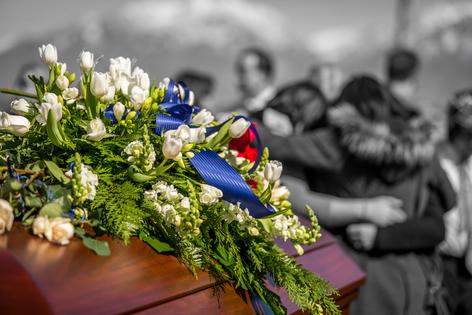Asking Eric: Casket photo creates rift in family
Dear Eric: Several years ago, my mother-in-law passed away due to dementia. During the time of her illness, my husband and I took care of everything, including selling her house, auctioning off her estate, dealing with her boyfriend who could never admit she had dementia, and dealing with the COVID restrictions for visiting her. Of note, my brother-in-law lives in the upper Midwest; we, and his mother, live in Florida. The burden was put on us, not him.
On the day of her viewing, it was only my husband and me. I took pictures of her lying peacefully in her casket and forwarded them on to my brother-in-law. I got a scathing email from my brother-in-law saying that he had specifically asked not to send pictures of her dead. He only wanted to remember her healthy (how convenient).
To be honest with you, I didn't remember that conversation as I was too stressed out from the whole ordeal. I feel guilty for sending the pictures but not really sorry for doing it because they finally had to deal with her passing firsthand. They did not have to live the ordeal like we did. I felt like the pictures were something I needed to share. Should I feel guilty for sending them, because I still do?
– Photo Regret
Dear Photo: Guilt is not a very useful emotion. It’s good information, sometimes, but what matters is what we do about the guilt, internally and externally.
I know that the complicated process of settling your mother-in-law’s affairs, particularly during COVID lockdown, was hard for you. But you’ve got to acknowledge that what your brother-in-law is dealing with, including his own denial about his mother’s illness, is hard, too. There’s no hierarchy of suffering. You can start to alleviate some of that suffering – yours and theirs – by reaching out, apologizing and trying to make amends.
In the grand scheme, you owe each other apologies. They didn’t show up for your mother-in-law in the ways that would have been helpful, and that’s not fair. But you don’t get to dictate how your brother-in-law remembers his mother or how he processes his grief. Your actions, as you’ve described them, weren’t malicious, but it’s important to acknowledge their impact.
Dear Eric: I'm friends with a pair of sisters, but closer with one than the other. Recently I invited them to a weekend getaway, where we were to be treated to a private chef's dinner. Less Close Sister immediately announced that she's "avoiding gluten," which obviously complicated our menu. On the drive up, she recounted her "cheat night" with plenty of gluten the evening before, and happily consumed a (gluten-containing) lunch. I know there's no right way to say, "your dietary needs seem to only pop up when you can be an inconvenience/pain in the butt," but I'm really soured on traveling with her again, although I like her. Suggestions?
– Gluten-tolerant
Dear Gluten-tolerant: The easiest solution is just not to have a private chef’s dinner, or, to let the chef figure out what to cook to meet everyone’s dietary needs. Isn’t that the chef’s job anyway?
It’s quite a leap to go from putting together a private dinner to swearing off traveling with this person again. Sometimes, when our opinions about people change, any little thing they do can become a point of annoyance. I wonder if that might be happening here. Something to consider.
Dear Eric: “Carpooling” wants to be reimbursed for gas for a 30-mile round-trip journey to pick up a friend’s disabled son from the bus stop. The request from the “dear friend” doesn’t happen very often. My two cents are this: Losing or even offending a “dear friend” isn’t worth any price, let alone the price of a few gallons of gas ($10 or less). True friends grant favor requests, when possible, and usually without expecting anything in return. If it becomes a regular request, then definitely broach the subject, but a rare request is truly a “favor,” and granting favors has a way of coming back to you. Instead, “Carpooling” could think of this favor as a meal she might take to her friend if she were sick (and would likely spend more than $10 in that case).
– Dear Friends are Priceless
Dear Priceless: Ten dollars is not the same everywhere nor is it the same to every budget. The letter writer isn’t just complaining; the letter states that the frequency of the requests, combined with the amount, created a financial hardship. It’s important to remember that everyone’s finances are different and one person’s easy favor is another person’s stretch. The pricelessness of dear friends goes both ways; if I had a dear friend whose load I could lighten by covering the price of gas, I’d leap at the opportunity to do so.
(Send questions to R. Eric Thomas at eric@askingeric.com or P.O. Box 22474, Philadelphia, PA 19110. Follow him on Instagram and sign up for his weekly newsletter at rericthomas.com.)
©2025 Tribune Content Agency, LLC.


















Comments